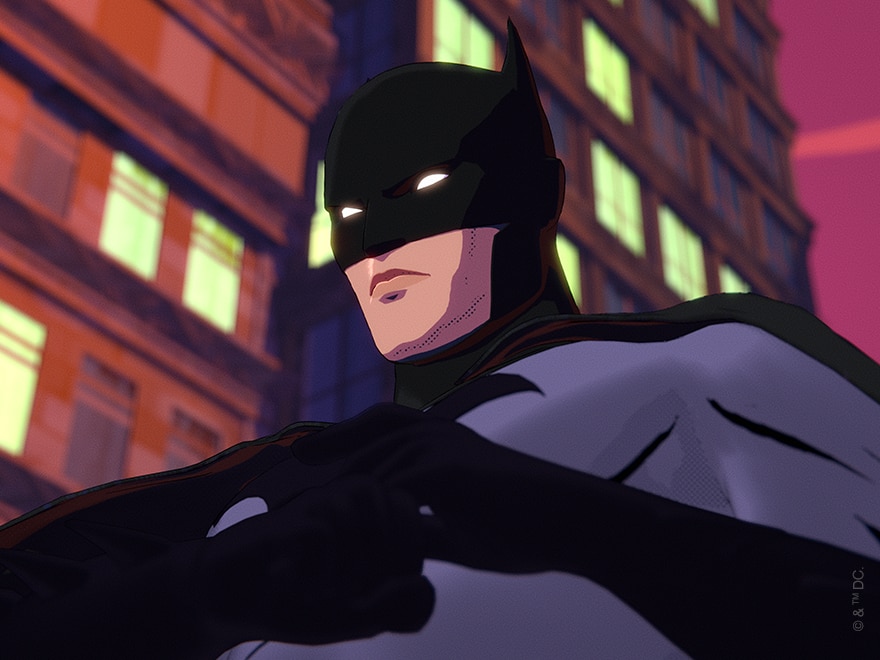This week brings us the premiere of DC Heroes United, a new weekly animated series connected to a perilously addictive mobile game. But what makes this show different from any other is that every week, it’s up to us to determine the fate of the world. We spoke to Genvid chief creative officer Stephan Bugaj and lead writer Brian Buccellato to find out as much as we can about what to expect from this bold new experiment. The answer, in short, is to expect everything.
Could you give us some idea of what to expect from DC Heroes United? It seems to be, from what I’ve absorbed, a completely original story set in its own evolving version of the DC Universe that we’ll get to see fully animated and voiced every week?
Stephan Bugaj: You’re right! It takes place in Earth-212, which is our Earth number that DC assigned for this universe. It’s an interactive, branching narrative, but it’s crowd-played. So, the entire audience competes with the people who disagree with them and collaborates with the people who agree with them to make the branching narrative decisions. Like you would in a Telltale game, or Bandersnatch, but collectively, by putting story tokens down on the choices they want to see, participating in rallies where you get bonuses for the story tokens, that branches a fully animated half hour TV show each week. And you’ll see the decisions of the outcomes the audience made each week.
So, basically what you’re telling me is that you’re giving us the opportunity to kill or spare Jason Todd every week.
SB: It is like the death of Robin every week! And in fact, there’s three to five choices each week. So, there’s a real impact that the audience is making. They’re making three to five decisions, and those decisions can have repercussions later, with what we call “callbacks.” So, the decision you made in episode one, you see the outcome in episode two. But in episode five, there might be a moment like, “Because you did that thing in episode one, I’m still mad at you!”
Brian Buccellato: There’s also cumulative repercussions for the end of the season. So, it’s not just episodic. It’s all building towards the forming of the Justice League.
How long are these seasons? Just so I can do the mental math of how many episodes you’ve actually written, as opposed to the ones that we’ll see.
SB: It’s sixteen episodes.
Okay! I’m seeing the fractal math and getting a headache here.
SB: And there’s three to five choices each episode. So, even without callbacks, there’s 150 plus paths through the story.
What I’m actually very curious about, and what I haven’t seen a lot of coverage on, is how you get these story tokens and what the gameplay aspect is between episodes. What will players be doing between episodes of DC Heroes United?
SB: So, there is a game that is a part of DC Heroes United. And the game is a Roguelite, like Survivo.io or Vampire Survivors.
In Earth-212, it’s the dawn of superheroes. Prior to our inciting incident, Wonder Woman is known, Batman is the Batman who lurks in the shadows and is kind of this vigilante in Gotham, and Superman is known as “The Metropolis Blur,” and no one knows who he really is. All of these heroes come out of the woodwork during our inciting incident. So, Lex Luthor, who does not start as a bad guy in our ‘verse—and maybe never will be, that’s up to user behavior—creates a simulation to try to understand and improve upon hero powers. So you’re playing the Lex Luthor simulation, playing out all these scenarios. You’re training Lex’s hero AI, to put it in contemporary context.
Even though it’s this simulation—the gameplay is not you playing as the actual heroes’, it’s the sim that Lex is running—the entire audience behavior in the sim influences not just the unlocks and stuff that they get in the roguelite, but also there are moments in the story that are impacted by what people have been doing in Lex’s simulation.
That’s exactly what I wanted to ask about. Other than the story tokens you earn, how do the game and the story feed into each other? Do we determine which characters get unlocked? Does the game change based on the story?
SB: There are connections. I think it’s going to be more fun for folks to wait and see. It’s not something as mechanical as unlocks, or things like that. It’s more that there are moments in the story where behavior in the game creates another branch. We were talking about the decision branches; there are even more than 150 paths, because there are a few little moments where what you’ve been doing in the sim is going to branch a little bit of what’s happening in the story.
Can you give us just one example of a kind of choice that the players will get to vote on?
SB: I’m going to have to try to do this without spoilers. So, let me put them into some categories. We’ve got a lot of choices that are about how characters relate to each other, how they treat each other. These are typical Telltale-style choices about advice that they give to each other, or reactions to someone’s behavior. There are, of course, choices that are like, “Do I punch this person or not?” But really more at a character relationship level than a tactical level.
BB: Like, the reason behind the punch is character-based and relationship-based.
SB: Then there are also some choices where you’re going to decide whether Batman, Wonder Woman or Superman are the one to do something, and to accept the consequences or reap the rewards.
And of course, they all have different approaches to what being a hero is.
BB: That’s really the core of it, isn’t it? I know early on, in the writer’s room, in the whole process of building a story, one of the big things was, “What does it mean to be a hero?” And it means very different things for Batman, Superman and Wonder Woman. They may have the same goal, but they’re going to go about it in different ways. I think this game, this experience, whatever you want to call it, is a really cool way to exploit that and give ownership to those choices.
The Tower of Fate plays a very big part in this story, and that was surprising to me, to see how big a role the magic side of the DC Universe is going to play in this story. What can you tell me about that? Are we going to see Doctor Fate show up here?
SB: So, we’re not going to talk about character spoilers. We’ll see where things go. But the Tower of Fate shows up on day one. You know things have gone wrong because the Tower of Fate shows up in Gotham. It plays an important role through a large portion of the season, and its impact is felt throughout. The nature of fate is definitely an important part of the story.
Brian, I’d like to talk about the writing team behind this game. I know you worked with a lot of great writers. I want to know what you think each member of the team really brought to this project.
BB: I mean, there’s always the lore side. Who knows what about which characters. I was on the project for two years. We did a lot of development. This wasn’t just hatched overnight. People came along at different periods of time and offered their perspective on characters. Gail Simone was part of the project, and she knows some of these characters better than we can ever hope to know them. But there are also just people who understand story, and who may not have had the lore as deep as others, but I think just understanding human nature can bring out sides of a character that you’ve never really seen before.
Obviously, everyone is talking about The Penguinand how amazing that finale was, right? They took a character that’s existed for a long time. But they made this incredible story out of the raw material. I think we did a lot of that. The spirit of the character is the same, right? I think there are tenets for each of these characters—they have to be who they are, no matter what Earth, no matter who’s wearing the mask. There are certain characteristics that make that core character. You can be true to that while exploring something new. And I think we had an opportunity to do that because we started from day one.
What are you most excited for DC Heroes United players to discover as they go through the season?
BB: Honestly, I’m as excited as everyone else. I just want to see it manifest in reality. For me, it’s been this concept, and so to actually experience it in real time, and then to see what conversations come out of that. To see how engaged these people are, how passionate they become for any given choice. For me, it’s just fascinating. I just want to know how people are going to react to it.
SB: I’m excited to see the fans’ reactions to being able to have the kind of arguments that people have had about comic books forever: “Oh, if only the writers had them do this different thing!”
[In DC Heroes United], you get to have this argument about the consequences of what might happen before it happens. So you’re not just having the argument in this vacuum. The whole system is designed to listen to you, and you get to argue about it before the decision closes and then see if you were right or not.
Spending years in comic book fandom, any time there’s a conversation about a decision made in a comic, there’s some discussion about the aspect of “Editorial Mandate.” It feels like this is the first story where the editor is the collective people watching the story.
SB: Oh yeah, it very much is. Obviously, there is plenty of core narrative because we have to produce an actual show, right? But they are editing a bunch of important points throughout the entire season. There’s a lot of branching possibilities. And DC has been super generous about allowing us to have these variations. An editor of a comic book is used to a linear format. Things happen that they say happen, and the writers follow the mandate. And, by the way, that’s not a bad thing. It’s a cool creative process. DC has been very generous, and very smart about getting on board with how this works and looking at the whole possibility space as the Editorial Mandate. It’s been a lot of fun. DC’s been a terrific partner on this, making things better and more connected to the fans in ways that we’re very grateful for.
BB: As somebody who’s had fans say that I ruined their favorite character through a choice that I’ve made—
You killed Guy Gardner, Brian! I haven’t forgotten!
BB: I did. See? Or, Godzilla beating Superman, or whatever the thing is. I’ll be looking forward to jumping online and throwing some shade back at the fans. “How could you choose C?!”
DC Heroes United Episode 1 is out now. You can stream it right here on DC.com.
This week brings us the premiere of DC Heroes United, a new weekly animated series connected to a perilously addictive mobile game. Read More

